





Acta Veterinaria et Zootechnica Sinica ›› 2025, Vol. 56 ›› Issue (8): 3942-3957.doi: 10.11843/j.issn.0366-6964.2025.08.032
• Preventive Veterinary Medicine • Previous Articles Next Articles
HAN Yin1,2( ), XIE Ziwei1,2, YAN Shuke1, XU Fei1,2, CHEN Ruiai1,2,3,4,*(
), XIE Ziwei1,2, YAN Shuke1, XU Fei1,2, CHEN Ruiai1,2,3,4,*( )
)
Received:2024-10-18
Online:2025-08-23
Published:2025-08-28
Contact:
CHEN Ruiai
E-mail:hanyin928@163.com;chensa727@vip.126.com
CLC Number:
HAN Yin, XIE Ziwei, YAN Shuke, XU Fei, CHEN Ruiai. Screening and Identification of Host Proteins Interacting with NP of Newcastle Disease Virus[J]. Acta Veterinaria et Zootechnica Sinica, 2025, 56(8): 3942-3957.
Table 1
Primer sequences"
| 引物名称 Primer name | 序列 Primer sequences |
| pXJ40-Flag-NP-F | 5′-gataagtccggatccaagcttATGTCGTCTGTTTTTGACGAATACG-3′ |
| pXJ40-Flag-NP-R | 5′-agttctgctttaataagatctTCAGTACCCCCAGTCAGTGTCG-3′ |
| pXJ40-Myc-HSP70-F | 5′-gaagaggatctgtccggatccATGTCTGGCAAAGGGCCG-3′ |
| pXJ40-Myc-HSP70-R | 5′-tctggtaccgagctcctgcagTTAATCTACTTCTTCAATGGTTGGGC-3′ |
| pXJ40-Myc-HSP70-NBD-F | 5′-gaagaggatctgtccggatccGGCAAAGGGCCGGCCATC-3′ |
| pXJ40-Myc-HSP70-NBD-R | 5′-tctggtaccgagctcctgcagTTCAGACTTGTCTCCCATGAGGA-3′ |
| pXJ40-Myc-HSP70-SBD-F | 5′-gaagaggatctgtccggatccTTGGATGTCACCCCCCTGT-3′ |
| pXJ40-Myc-HSP70-SBD-R | 5′-tctggtaccgagctcctgcagGCGACCCTTGTCATTGGTGA-3′ |
| pXJ40-Flag-F | 5′-ACATCCTGGTCATCATCCTG-3′ |
| pXJ40-Flag-R | 5′-ACCACAACTAGAATGCAGTG-3′ |
| pXJ40-Myc-F | 5′-ATCCTGCCTTTCTCTTTATGGT-3′ |
| pXJ40-Myc-R | 5′-TAACCGTATTACCGCCTTTGAGTG-3′ |
Table 2
qPCR primers"
| 引物名称 Primer name | 引物序列 Primer sequences |
| q-DHN3-F | 5′-CTCATAGCAGGCTCCTGTCG-3′ |
| q-DHN3-R | 5′-CAGTTGTGCGATCATGCGAG-3′ |
| q-NP-F | 5′-TGAGCACATCATTCTGGCGA-3′ |
| q-NP-R | 5′-CAGATACTCGTTGGGCAGCA-3′ |
| q-HSP70-F | 5′-ATTCTTGCGTGGGTGTCTTC-3′ |
| q-HSP70-R | 5′-GATGGTGTTGGTGGGGTTC-3′ |
| q-β-Actin-F | 5′-CTGTGCCCATCTATGAAGGCTA-3′ |
| q-β-Actin-R | 5′-ATTTCTCTCTCGGCTGTGGTG-3′ |
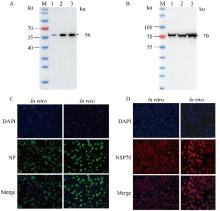
Fig. 2
Overexpression of recombinant plasmids pXJ40-Flag-NP and pXJ40-Myc-HSP70 A. Expression of pXJ40-Flag-NP in DF-1 cells (Lane 1. Transfection of 1 μg pXJ40-Flag-NP plasmid; 2. Transfection of 1.5 μg pXJ40-Flag-NP plasmid; 3. Transfection of 2 μg pXJ40-Flag-NP plasmid); B. Expression of pXJ40-Myc-HSP70 in DF-1 cells (Lane 1. Transfection of 1 μg pXJ40-Myc-HSP70 plasmid; 2. Transfection of 1.5 μg pXJ40-Myc-HSP70 plasmid; 3. Transfection of 2 μg pXJ40-Myc-HSP70 plasmid); C. Immunofluorescence staining of pXJ40-Flag-NP in DF-1 cells(40×); D. Immunofluorescence staining of pXJ40-Myc-HSP70 in DF-1 cells (40×)"

Table 4
Selected host-interacting proteins identified by mass spectrometry"
| 登录号 Accession No. | 基因名称 Gene Name | 大小/ku MW | 覆盖率/% Coverage | 肽段 Peptides |
| A0A1C9KD18 | ANXA2 | 38.6 | 71 | 27 |
| Q7SX63 | HSP70 | 69.9 | 49 | 31 |
| H9KZT7 | ILF2 | 54.3 | 3 | 1 |
| F1NJS6 | KPNA2 | 55.9 | 28 | 10 |
| F1NVA4 | NPM1 | 43.7 | 28 | 10 |
| A0A1D5NYB2 | PABPC1 | 70.8 | 36 | 23 |
| A0A1D5PJW4 | PSMA7 | 27.9 | 44 | 10 |
| Q6DV79 | STAT3 | 88.1 | 14 | 7 |
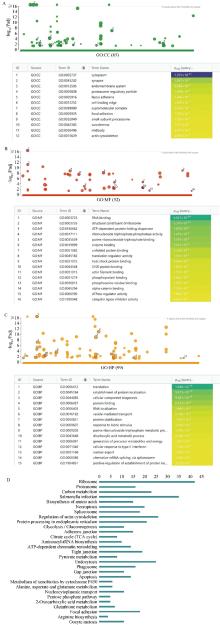
Fig. 4
Bioinformatics analysis of differential genes A. Enrichment analysis of differentially expressed genes in GO cellular component; B. Enrichment analysis of differentially expressed genes in GO molecular function; C. Enrichment analysis of differentially expressed genes in GO biological process; D. Enrichment analysis of differentially expressed genes in KEGG"

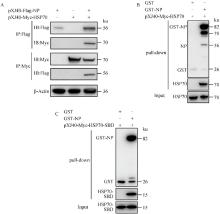
Fig. 5
Identification of the interaction between NDV NP and host protein HSP70 A. The interaction between NP and HSP70 was verified by Co-immunoprecipitation; B. The interaction between NP and HSP70 was verified by GST-pull down in vitro; C. The interaction between NP and HSP70-SBD was verified by GST-pull down in vitro"

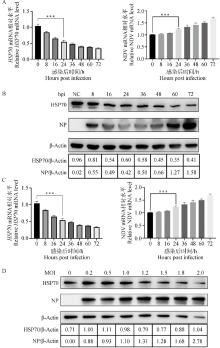
Fig. 7
NDV infection downregulates HSP70 expression A. Effect of mRNA levels of HSP70/NDV with time of viral infection; B. Protein levels of HSP70 and NP with time of viral infection; C. Effects of changes in mRNA levels of HSP70/NDV with different viral MOI; D. Effects of changes in protein levels of HSP70 and NP with different viral MOI. ***. P < 0.001"

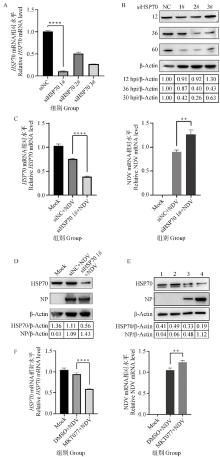
Fig. 9
Knockdown of endogenous HSP70 promotes NDV replication A, B. Detection the mRNA and protein levels of HSP70 by qRT-PCR and Western blot after transfection of different siRNAs targeting HSP70 in DF-1 cells; C After knockdown of endogenous HSP70, mRNA levels of HSP70 and NP were detected using qRT-PCR; D. After knockdown of endogenous HSP70, protein levels of HSP70 and NP were detected using Western-blot; E After addition of the HSP70 inhibitor MKT-077, protein levels of HSP70 and NP were detected using Western-blot. Note: lane1 was Mock; lane2 was DMSO; lane3 was DMSO+NDV; lane4 was MKT-007+NDV; F. After addition of the HSP70 inhibitor MKT-077, mRNA levels of HSP70 and NP were detected using qRT-PCR. **. P < 0.01, ****. P < 0.000 1"

| 1 |
DIMITROV K M , RAMEY A M , QIU X , et al. Temporal, geographic, and host distribution of avian paramyxovirus 1 (Newcastle disease virus)[J]. Infect Gene Evolut, 2016, 39, 22- 34.
doi: 10.1016/j.meegid.2016.01.008 |
| 2 |
BUTT S L , MOURA V , SUSTA L , et al. Tropism of Newcastle disease virus strains for chicken neurons, astrocytes, oligodendrocytes, and microglia[J]. BMC Vet Res, 2019, 15 (1): 317.
doi: 10.1186/s12917-019-2053-z |
| 3 |
AMARASINGHE G K , AYLLON M A , BAO Y , et al. Taxonomy of the order Mononegavirales: update 2019[J]. Arch Virol, 2019, 164 (7): 1967- 1980.
doi: 10.1007/s00705-019-04247-4 |
| 4 |
PANTUA H D , MCGINNES L W , PEEPLES M E , et al. Requirements for the assembly and release of Newcastle disease virus-like particles[J]. J Virol, 2006, 80 (22): 11062- 11073.
doi: 10.1128/JVI.00726-06 |
| 5 | STEWARD M , VIPOND I B , MILLAR N S , et al. RNA editing in Newcastle disease virus[J]. J Gen Virol, 1993, 74 (Pt 12): 2539- 2547. |
| 6 |
KARSUNKE J , HEIDEN S , MURR M , et al. W protein expression by Newcastle disease virus[J]. Virus Res, 2019, 263, 207- 216.
doi: 10.1016/j.virusres.2019.02.003 |
| 7 |
GOFF P H , GAO Q , PALESE P . A majority of infectious Newcastle disease virus particles contain a single genome, while a minority contain multiple genomes[J]. J Virol, 2012, 86 (19): 10852- 10856.
doi: 10.1128/JVI.01298-12 |
| 8 |
LONEY C , MOTTET-OSMAN G , ROUX L , et al. Paramyxovirus ultrastructure and genome packaging: cryo-electron tomography of sendai virus[J]. J Virol, 2009, 83 (16): 8191- 8197.
doi: 10.1128/JVI.00693-09 |
| 9 |
LIAO T , CHEN Y , GUO L , et al. The NP protein of Newcastle disease virus dictates its oncolytic activity by regulating viral mRNA translation efficiency[J]. PLoS Pathog, 2024, 20 (2): e1012027.
doi: 10.1371/journal.ppat.1012027 |
| 10 |
CHENG J H , SUN Y J , ZHANG F Q , et al. Newcastle disease virus NP and P proteins induce autophagy via the endoplasmic reticulum stress-related unfolded protein response[J]. Sci Rep, 2016, 6, 24721.
doi: 10.1038/srep24721 |
| 11 |
ROSENZWEIG R , NILLEGODA N B , MAYER M P , et al. The Hsp70 chaperone network[J]. Nat Rev Mol Cell Biol, 2019, 20 (11): 665- 680.
doi: 10.1038/s41580-019-0133-3 |
| 12 |
SU Y S , HSIEH P Y , LI J S , et al. The heat shock protein 70 family of chaperones regulates all phases of the enterovirus A71 life cycle[J]. Front Microbiol, 2020, 11, 1656.
doi: 10.3389/fmicb.2020.01656 |
| 13 |
MACEJAK D G , SARNOW P . Association of heat shock protein 70 with enterovirus capsid precursor P1 in infected human cells[J]. J Virol, 1992, 66 (3): 1520- 1527.
doi: 10.1128/jvi.66.3.1520-1527.1992 |
| 14 | XU T , LIN Z , WANG C , et al. Heat shock protein 70 as a supplementary receptor facilitates enterovirus 71 infections in vitro[J]. Microb Pathog, 2019, 128, 106- 111. |
| 15 |
HAN C , XIE Z , LV Y , et al. Direct interaction of the molecular chaperone GRP78/BiP with the Newcastle disease virus hemagglutinin-neuraminidase protein plays a vital role in viral attachment to and infection of culture cells[J]. Front Immunol, 2023, 14, 1259237.
doi: 10.3389/fimmu.2023.1259237 |
| 16 |
SHOKEEN K , SRIVATHSAN A , KUMAR S . Lithium chloride functions as Newcastle disease virus-induced ER-stress modulator and confers anti-viral effect[J]. Virus Res, 2021, 292, 198223.
doi: 10.1016/j.virusres.2020.198223 |
| 17 | YE T , JIANG K , WEI L , et al. Oncolytic Newcastle disease virus induces autophagy-dependent immunogenic cell death in lung cancer cells[J]. Am J Cancer Res, 2018, 8 (8): 1514- 1527. |
| 18 |
ZHANG D , DING Z , XU X . Pathologic mechanisms of the Newcastle disease virus[J]. Viruses, 2023, 15 (4): 864.
doi: 10.3390/v15040864 |
| 19 |
ZHAN Y , YU S , YANG S , et al. Newcastle disease virus infection activates PI3K/Akt/mTOR and p38 MAPK/Mnk1 pathways to benefit viral mRNA translation via interaction of the viral NP protein and host eIF4E[J]. PLoS Pathog, 2020, 16 (6): e1008610.
doi: 10.1371/journal.ppat.1008610 |
| 20 |
KAUR R , BATRA J , STUCHLIK O , et al. Heterogeneous ribonucleoprotein A1 (hnRNPA1) interacts with the nucleoprotein of the influenza A virus and impedes virus replication[J]. Viruses, 2022, 14 (2): 199.
doi: 10.3390/v14020199 |
| 21 | OGLESBEE M J , LIU Z , KENNEY H , et al. The highly inducible member of the 70 ku family of heat shock proteins increases canine distemper virus polymerase activity[J]. J Gen Virol, 1996, 77 (Pt 9): 2125- 2135. |
| 22 |
KUMSTA C , JAKOB U . Redox-regulated chaperones[J]. Biochemistry, 2009, 48 (22): 4666- 4676.
doi: 10.1021/bi9003556 |
| 23 |
AGOSTINI I , POPOV S , LI J , et al. Heat-shock protein 70 can replace viral protein R of HIV-1 during nuclear import of the viral preintegration complex[J]. Exp Cell Res, 2000, 259 (2): 398- 403.
doi: 10.1006/excr.2000.4992 |
| 24 |
TAKASHIMA K , OSHIUMI H , MATSUMOTO M , et al. DNAJB1/HSP40 suppresses melanoma differentiation-associated gene 5-mitochondrial antiviral signaling protein function in conjunction with HSP70[J]. J Innate Immun, 2018, 10 (1): 44- 55.
doi: 10.1159/000480740 |
| 25 |
SUN M , YU Z , MA J , et al. Down-regulating heat shock protein 27 is involved in porcine epidemic diarrhea virus escaping from host antiviral mechanism[J]. Vet Microbiol, 2017, 205, 6- 13.
doi: 10.1016/j.vetmic.2017.04.031 |
| 26 |
LE Y , JIA P , JIN Y , et al. The antiviral role of heat shock protein 27 against red spotted grouper nervous necrosis virus infection in sea perch[J]. Fish Shellfish Immunol, 2017, 70, 185- 194.
doi: 10.1016/j.fsi.2017.08.032 |
| 27 |
HAUSER H , SHEN L , GU Q L , et al. Secretory heat-shock protein as a dendritic cell-targeting molecule: a new strategy to enhance the potency of genetic vaccines[J]. Gene Ther, 2004, 11 (11): 924- 932.
doi: 10.1038/sj.gt.3302160 |
| [1] | LIU Sha, YANG Caichun, ZHANG Xiaoyu, CHEN Qiong, LIU Xiong, CHEN Hongbo, ZHOU Huanhuan, SHI Liangyu. Population Genetic Structure and Genome-wide Runs of Homozygosity Analysis in Meihuaxing Pigs Based on 80K SNP Chip [J]. Acta Veterinaria et Zootechnica Sinica, 2025, 56(8): 3749-3760. |
| [2] | ZHANG Jialiang, HUANG Chang, YANG Yonglin, YANG Hua, BAI Wenlin, MA Yuehui, ZHAO Qianjun. Genetic Structure and Wool Trait Selection Signatures Analysis of Chinese Sheep Populations Based on 50K Liquid SNP Chip [J]. Acta Veterinaria et Zootechnica Sinica, 2025, 56(7): 3164-3176. |
| [3] | MIAO Junjie, ZHANG Riquan, WU Houyi, YOU Xinming, HUANG Yiwen, HUANG Xiaoying, GUO Zhenyang, LIU Jianlin, XIAO Weihua, GUO Tianhua, CHEN Hao, KANG Dongliu. Genome-Wide SNP Analysis Revealed the Characteristics of Germplasm Resources and Genetic Diversity of Jinggang Black-Palm Geese [J]. Acta Veterinaria et Zootechnica Sinica, 2025, 56(7): 3199-3209. |
| [4] | WU Jianliang, SU Yang, MAO Ruihan, ZHOU Lei, YAN Tiantian, LI Zhi, LIU Jianfeng. Design and Effect Evaluation of A Whole-Genome Low-Density SNP Chip in Pigs [J]. Acta Veterinaria et Zootechnica Sinica, 2025, 56(6): 2733-2740. |
| [5] | YAO Boyuan, YANG Zhiwen, SUN Yapeng, YANG Yanan, ZHANG Yaru, WANG Xinrong. Analysis of Novel Transcripts, Alternative Splicing, and SNP in Porcine Heart Tissue Based on RNA-Seq Technology [J]. Acta Veterinaria et Zootechnica Sinica, 2025, 56(4): 1664-1675. |
| [6] | HUANG Cheng, YANG Zhiyuan, LIN Jian, CHENG Huimin, WANG Mi, MAO Huilin, WANG Guoliang, LIU Guiming, ZHAO Jicheng, LIU Yuehuan. Construction and Efficacy Evaluation of mRNA Vaccines against H9 Subtype Avian Influenza Virus [J]. Acta Veterinaria et Zootechnica Sinica, 2025, 56(4): 1843-1853. |
| [7] | ZHOU Taizeng, YANG Yiting, ZHU Yuehua, QIAN Hongxi, LIU Yihui, GAN Mailin, ZHU Li, SHEN Linyuan. Genome-wide Association Study of Stillbirths and Mummies in Sows [J]. Acta Veterinaria et Zootechnica Sinica, 2025, 56(3): 1231-1241. |
| [8] | GAO Zhiqiang, LAI Ping'an, SONG Yueqian, CHONG Yan, GUO Youran, BAI Zilong, GUO Huimin, WANG Lin, PU Jing, SHI Xiju, REN Tong, ZHAO Xiangpeng. Studies and Application of Multi-target Nucleic Acid Mass Spectrometry Detection Method for Avian Influenza/Newcastle Disease Virus [J]. Acta Veterinaria et Zootechnica Sinica, 2025, 56(3): 1386-1395. |
| [9] | YANG Xiaowen, NING Wenqing, ZHOU Shizhong, YUAN Yaqin, HOU Xuexin, DING Jiabo. Establishment of a Quantitative Real-time PCR Detection Method for Trimethoprim-Sulfamethoxazole-resistance Strains of Brucella melitensis [J]. Acta Veterinaria et Zootechnica Sinica, 2025, 56(3): 1465-1472. |
| [10] | YIN Qiong, GAO Mingchao, YAO Xiumei, LIU Kunyu, LIU Wei, JIE Hongwei, LI Hua, YE Fei. Correlation Analysis between Melanin Content in Breast Muscle and PMEL17 Gene of Muchuan Black-bone Chickens [J]. Acta Veterinaria et Zootechnica Sinica, 2025, 56(1): 168-177. |
| [11] | Guangxuan FAN, Tianjiao WANG, Yimeng DONG, Hongliang WANG, Ning DING, Xinhao WANG, Xiumei XING. Molecular Genealogy Construction and Population Genetic Structure Analysis of Jilin Sika Deer Based on SNP Loci [J]. Acta Veterinaria et Zootechnica Sinica, 2024, 55(9): 3925-3935. |
| [12] | Ruiqi ZHANG, Yanqin PANG, Zaishan LI, Xiuguo SHANG, Ganqiu LAN, Jinbiao GUO, Yunxiang ZHAO. Research on Feeding Capacity Selection of Lactating Sows Based on Intelligent Precision Feeding [J]. Acta Veterinaria et Zootechnica Sinica, 2024, 55(7): 2890-2900. |
| [13] | DUAN Yixin, ZHANG Linyun, ZHAO Yongju. The Evaluated Methods and Influencing Factors of SNP Heritability and Its Application in Farmer Animal Breeding [J]. Acta Veterinaria et Zootechnica Sinica, 2024, 55(5): 1854-1865. |
| [14] | CUI Shengdi, WANG Kai, ZHAO Zhenjian, CHEN Dong, SHEN Qi, YU Yang, WANG Junge, CHEN Ziyang, YU Shixin, CHEN Jiamiao, WANG Xiangfeng, TANG Guoqing. Identification of Candidate Genes for Pork Texture Traits Using GWAS Combined with Co-localisation of DNA Methylation [J]. Acta Veterinaria et Zootechnica Sinica, 2024, 55(5): 1945-1957. |
| [15] | SUN Wenli, WANG Haoqi, ZE Licuo, GAO Yufan, ZHANG Feifan, ZHANG Jian, DUAN Mengqi, SHANG Peng, QIANG Bayangzong. Polymorphism of Pro-Inflammatory Factors (IL-1β, IL-6, TNF-α) in Tibetan Pigs and Its Association Analysis with Immune Traits [J]. Acta Veterinaria et Zootechnica Sinica, 2024, 55(5): 1958-1969. |
| Viewed | ||||||
|
Full text |
|
|||||
|
Abstract |
|
|||||